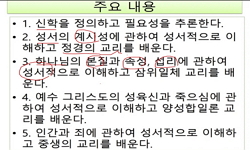This paper elucidates the meaning of Scripture and religion in Spinoza's thought. Now that Spinoza's naturalistic ontology, equating God with nature, denies the personality of God, there have been many studies interpreting Scripture and revealed relig...
http://chineseinput.net/에서 pinyin(병음)방식으로 중국어를 변환할 수 있습니다.
변환된 중국어를 복사하여 사용하시면 됩니다.
- 中文 을 입력하시려면 zhongwen을 입력하시고 space를누르시면됩니다.
- 北京 을 입력하시려면 beijing을 입력하시고 space를 누르시면 됩니다.

스피노자의 종교론 연구 - 성서해석과 철학의 관계를 중심으로 - = A study on Spinoza’s theory of religion -Focused on relationship between interpretation of Scripture and philosophy-
한글로보기부가정보
다국어 초록 (Multilingual Abstract)
This paper elucidates the meaning of Scripture and religion in Spinoza's thought. Now that Spinoza's naturalistic ontology, equating God with nature, denies the personality of God, there have been many studies interpreting Scripture and revealed religion as remnants of superstition. However, Spinoza wrote not only Ethica stating the idea of a natural god, also Tractatus Theologico-Politicus, which is a close interpretation of Scripture. This paper aims to present Spinoza’s exact view of the relationship between philosophy and religion by fully examining his interpretation of Scripture. Revelation in Scripture is expressed in an imaginary way, rather than relying on high-level rational speculation. But the concept of revelation should not be taken negatively. In fact, Spinoza regarded revelation as knowledge and recognized its certainty. The certainty of revelation, as that of the moral dimension, is not theoretical or rational, but it is undoubtedly true that it also represents certainty. In other words, Scripture has a consistency, which does not lie in the level of theory Scripture, not as a rational system but as an imaginary one, identifies the practical norms through the imaginary structure necessary for salvation. The essential point of biblical teachings is that it equates faith or submission to God with justice or compassion for neighbors. Although philosophy retains total freedom of thought, it must also acknowledge that religion has its realm reaching the same destination through its own way completely different from reason. Reason and faith or philosophy and religion cannot be in conflict because of their different domains.
국문 초록 (Abstract)
본 논문은 스피노자의 사상에서 성서와 종교가 갖는 의미를 해명한다. 신과 자연을 동일시하는 스피노자의 자연주의적 존재론은 인격신을 부정하기 때문에 많은 스피노자 철학 연구는 성서...
본 논문은 스피노자의 사상에서 성서와 종교가 갖는 의미를 해명한다. 신과 자연을 동일시하는 스피노자의 자연주의적 존재론은 인격신을 부정하기 때문에 많은 스피노자 철학 연구는 성서 및 계시종교를 미신의 잔재에 불과한 것처럼 해석한다. 그러나 스피노자는 자연신 개념을 개진한 에티카 외에 엄밀한 성서 해석서인 신학정치론을 집필했다. 본 논문은 스피노자의 성서해석을 전면적으로 규명함으로써 철학과 종교의 관계에 대한 그의 관점을 제시하고자 한다. 성서의 계시는 고차원적인 이성적 사변을 요청하기보다는 상상적인 방식으로 표현된다. 그러나 계시의 의미를 부정적으로 이해해서는 안 된다. 실제로 스피노자는 계시를 지식으로 간주하고 그 확실성을 인정한다. 계시의 확실성은 도덕적 차원의 확실성으로서 이론적이고 이성적인 것은 아니지만 분명히 확실성을 표현한다. 즉 성서는 일관성을 가지고 있으며 그것은 이론적인 차원의 것이 아니다. 성서는 이성의 체계가 아닌 상상의 체계로서 구원에 필요한 상상의 조직을 통해 실천적 규범을 규정한다. 성서의 가르침의 본질적인 점은 신앙 또는 신에의 복종을 정의와 이웃에 대한 자비심과 동일시하는 것이다. 철학은 전적인 사유의 자유를 유지하지만, 또한 종교가 이성과 완전히 다른 자기 고유의 길을 통해 동일한 목적지에 도달하는 영역을 가진다는 점을 인정해야 한다. 이성과 신앙, 철학과 종교는 서로의 영역이 다르기 때문에 상충될 수 없다.
참고문헌 (Reference)
1 조현진, "스피노자의 종교 비판의 의미와 그 함축 -미신과 참된 종교의 구분, 비철학적 구원의 문제를 중심으로" 인문과학연구소 (45) : 317-345, 2015
2 이근세, "스피노자의 정치철학에서 개인의 자유와 정치적 복종의 관계" 대동철학회 (67) : 125-150, 2014
3 이근세, "스피노자와 도덕의 문제" 선학사 2003
4 공진성, "스피노자, 관용, 그리고 종교적 불복종의 문제" 한국정치사상학회 13 (13): 102-131, 2007
5 Spinoza, Spinoza Oeuvres III, "Tractatus teologico-politicus, Traitéthéologico-politique" PUF 1999
6 Stanislas Breton, "Spinoza, théologie et politique" Desclée 1977
7 André Tosel, "Spinoza ou crépuscule de la servitude" Aubier 1984
8 Jacqueline Lagrée, "Spinoza et le débat religieux, Lectures du Traitéthéologico-politique" Presses universitaires de Renne 2004
9 Sylvain Zac, "Spinoza et l'interprétation de l'Écriture" PUF 1965
10 François Jullien, "Ressouces du Christianisme" L'Herne 2018
1 조현진, "스피노자의 종교 비판의 의미와 그 함축 -미신과 참된 종교의 구분, 비철학적 구원의 문제를 중심으로" 인문과학연구소 (45) : 317-345, 2015
2 이근세, "스피노자의 정치철학에서 개인의 자유와 정치적 복종의 관계" 대동철학회 (67) : 125-150, 2014
3 이근세, "스피노자와 도덕의 문제" 선학사 2003
4 공진성, "스피노자, 관용, 그리고 종교적 불복종의 문제" 한국정치사상학회 13 (13): 102-131, 2007
5 Spinoza, Spinoza Oeuvres III, "Tractatus teologico-politicus, Traitéthéologico-politique" PUF 1999
6 Stanislas Breton, "Spinoza, théologie et politique" Desclée 1977
7 André Tosel, "Spinoza ou crépuscule de la servitude" Aubier 1984
8 Jacqueline Lagrée, "Spinoza et le débat religieux, Lectures du Traitéthéologico-politique" Presses universitaires de Renne 2004
9 Sylvain Zac, "Spinoza et l'interprétation de l'Écriture" PUF 1965
10 François Jullien, "Ressouces du Christianisme" L'Herne 2018
11 Alexandre Matheron, "Le Christ et le salut des ignorants chez Spinoza" Aubier 1971
12 Alexandre Matheron, "Individu et communauté chez Spinoza" Les Ed. de Minuit 1969
13 Henri Laux, "Imagination et Religion chez Spinoza: La potentia dans l'histoire" Vrin 1993
14 Emmanuel Lévinas, "Difficile liberté" Le Livre de Poche 2003
15 Spinoza, Ethica, "Appuhn, 2 vols" Garnier 1906
동일학술지(권/호) 다른 논문
-
- 중앙대학교 중앙철학연구소
- 윤채우
- 2020
- KCI등재
-
물음의 책임 : 박동환 철학의 지렛목(hypomochilum)
- 중앙대학교 중앙철학연구소
- 김동규
- 2020
- KCI등재
-
최명길(崔鳴吉)과 조익(趙翼)의 경전 해석 경향과 그 의의: 사문록, 「맹자기의(孟子記疑)」를 중심으로
- 중앙대학교 중앙철학연구소
- 이해임
- 2020
- KCI등재
-
Can Perceptual Experience Be Both Representational and Relational?
- 중앙대학교 중앙철학연구소
- 강석만
- 2020
- KCI등재
분석정보
인용정보 인용지수 설명보기
학술지 이력
| 연월일 | 이력구분 | 이력상세 | 등재구분 |
|---|---|---|---|
| 2026 | 평가예정 | 재인증평가 신청대상 (재인증) | |
| 2020-01-01 | 평가 | 등재학술지 유지 (재인증) |  |
| 2017-01-01 | 평가 | 등재학술지 유지 (계속평가) |  |
| 2014-01-23 | 학술지명변경 | 한글명 : 철학탐구 -> 철학탐구 외국어명 : 미등록 -> Philosophical Investigation |  |
| 2013-01-01 | 평가 | 등재학술지 유지 (등재유지) |  |
| 2010-01-01 | 평가 | 등재학술지 유지 (등재유지) |  |
| 2007-01-01 | 평가 | 등재학술지 선정 (등재후보2차) |  |
| 2006-01-01 | 평가 | 등재후보 1차 PASS (등재후보1차) |  |
| 2004-01-01 | 평가 | 등재후보학술지 선정 (신규평가) |  |
학술지 인용정보
| 기준연도 | WOS-KCI 통합IF(2년) | KCIF(2년) | KCIF(3년) |
|---|---|---|---|
| 2016 | 0.41 | 0.41 | 0.37 |
| KCIF(4년) | KCIF(5년) | 중심성지수(3년) | 즉시성지수 |
| 0.39 | 0.37 | 0.93 | 0.19 |




 KCI
KCI DBpia
DBpia






